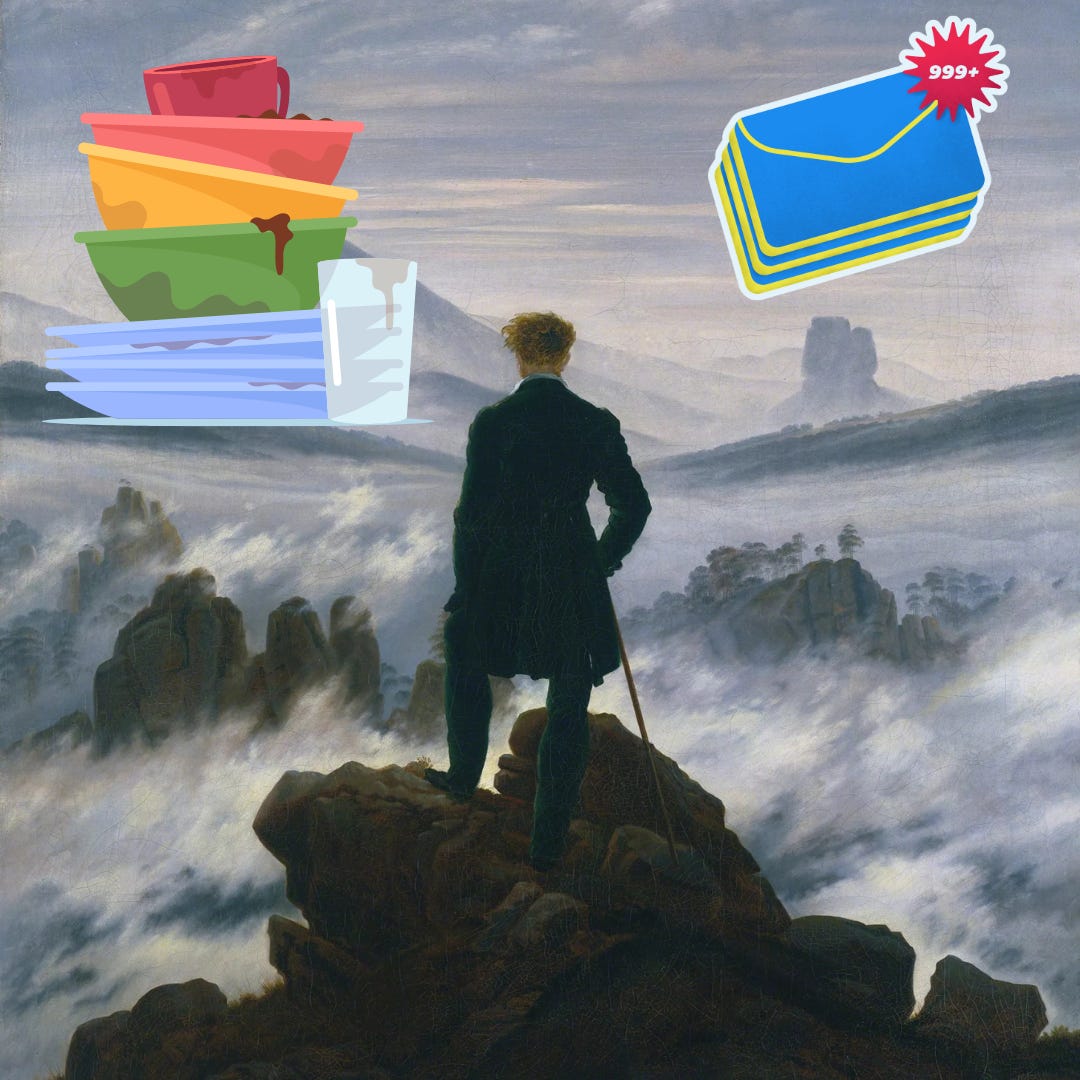The Hidden Pleasure of The Task | The Existential List #16
AKA cutting through the fog
Dear Reader,
Today, I hope you get a chance to recognize the pleasure hidden in that task you’ve been avoiding. I’m talking about the subtle pleasure which is unlocked when the unsent email is sent, the unwashed dishes are washed, the underused gym membership is used well, etc.
Often, the pleasure inherent in the task is hidden by a thick mind fog we project onto it. The mind fog convinces us that the task is way more difficult, painful and overwhelming than it actually is. The mind fog makes us forget how good we felt when we were in the groove of getting our tasks done. The mind fog feeds on our worries, and instructs us to seek out every easily available, quick-hit-of-dopamine, low quality pleasure imaginable - all apart from that elusive pleasure hidden in the fog.
Why does the fog do that? Well, in a strange and misguided way, its looking out for you. You see, the mind fog wants to protect you by maximizing pleasure and minimizing pain. However, it is unable to grasp that frequent hits of low-quality pleasure loops back into pain. It’s also unable to grasp that the short-term discomfort that comes with diligence opens the door to a deeper, more lasting sense of fulfillment.
My namesake Epicurus figured out the counter-intuitive nature of the relationship between pleasure and pain about 2300 years ago, and wrote:
…[We] do not choose every pleasure whatever, but often pass over many pleasures when a greater discomfort ensues from them. And often we consider pains superior to pleasures when submission to the pains for a long time brings us as a consequence a greater pleasure.
- Epicurus, Letter to Menoeceus
Let’s summarize. The mind fog tries to ‘protect’ you by:
1) playing up the pleasure of short-term comfort;
2) playing up the pain of short-term discomfort;
3) underplaying the long-term pleasure that comes from attending to short-term goals;
4) underplaying the long-term pain that comes from leaving short-term goals unattended.
So, how do you cut through the fog?
Call its bluff. Reach out through the haze and make first contact with the task. Do one dish. Send one email. Complete one rep. Just begin.
Once you begin, you’ll see that the task isn’t as formidable as it seemed. There’s no boogeyman lurking in the mist. There is only you and the task. With each step forward, the fog dissipates.
As you continue to push through, you will likely notice that the only discomfort that remains is the actual effort of doing the task, not the ghostly discomfort imposed on the task by your thoughts.
And as you get into the groove, you may find that there is pleasure not only in the task’s completion but also in the effort itself. Slowly getting into a rhythm, rediscovering focus, and making steady progress toward something meaningful. That’s the good stuff.
In pushing through, you aren’t just tackling a task; you’re reclaiming yourself from the mind fog, and choosing a more fulfilling path to pleasure.
Now, an important little parting note:
As long-time readers will know, I am not a fan of extremes or self-flagellation disguised as discipline. There will be times when tasks slip away from us, when life intervenes, or when we simply need a break from our routines. During these moments, it’s just as important to allow yourself the grace to rest and reset without guilt.
For some of us, our fog is of a different kind: one that makes us believe that pausing is failure, that constant productivity is the only path to worthiness, and that if we aren’t constantly pushing, we are falling behind.
How do we cut through this other kind of fog? Well, that’s exactly what we will cover in the next edition of The Existential List, so stay tuned!
Love,
Yepi
P.S: To learn more about 1:1 existential consultations with me, and to book a free introductory session, please head over to my online calendar.



